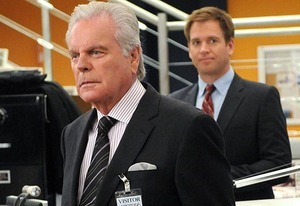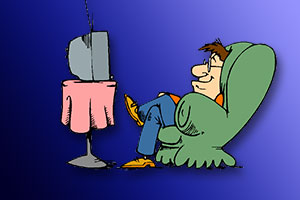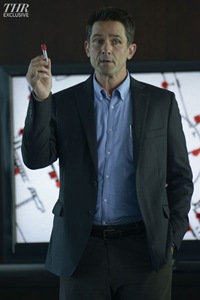来源:好莱坞记者报
The dust has settled over Uncle Jack’s (Michael Bowen) bullet-ridden compound. Walt (Bryan Cranston) is dead and Jesse (Aaron Paul) has driven off into the unknown, smiling like a madman.
For Peter Gould, a longtime writer and co-executive producer for the show, the crux of the finale was Walt’s startling admission to Skyler (Anna Gunn) that he’d carried out his Heisenberg duties for himself, not for his family. It was a revelation for Walt alone, as Skyler — and the audience — had known (or at least suspected) this for some time.
“When we were working on the series, we always talked about ‘When does he see himself the way we see him? When does he realize the ends don’t justify the means?’ ” Gould tells The Hollywood Reporter. “We eventually realized, ‘That’s the end of the show.’ When he’s no longer lying to himself, that is truly the end for Walt.”
Gould says Walt has craved recognition as an important, influential man throughout the series. But he gives up the credit for the money Gretchen (Jessica Hecht) and Elliott (Adam Godley) will give to Walt Jr. (R.J. Mitte)
“In the end, does it redeem him? How can you redeem yourself after all this death?” Gould asks. “I don’t think it is redemption. But I think it is a tiny bit of insight.”
Find THR’s full conversation below, in which Gould reveals why deciding to let Jesse (Aaron Paul) live was a big relief to the writers (he “had suffered enough”) and teases his Breaking Bad spinoff, tentatively titled Better Call Saul.
What kinds of challenges did you and the other writers face with this finale?
One of the big challenges we had, especially after the incredible events of “Ozymandias,” was figuring out if Walt had any options to get his money to his family. It was a big breakthrough for us when we realized Gretchen and Elliott are kind of a gateway for him to have some legacy, even with a family that now despises him and rejects him.
Walt was ready to give up, and seeing Gretchen and Elliott on Charlie Rose brought him back.
I feel that he would not have gone after the Nazis the way he did if he hadn’t known he had given his best shot at leaving a legacy for his family. It’s a question of unfinished business.
A big moment comes when Walt admits to Skyler, “I did it for me.” As an audience, we’ve assumed this for some time. How early did you know Walt would have this revelation about himself?
When we were working on the series, we always talked about “When does he see himself the way we see him? When does he realize the ends don’t justify the means?” We eventually realized, “That’s the end of the show.” When he’s no longer lying to himself, that is truly the end for Walt.
What were some of the earlier moments when you had discussions about whether Walt would see himself for what he truly was?
One time was after Jane’s death. There was such a parallel between Walt and Jane’s father, and Jane and his own daughter. It was just visceral. He was able to put her death aside and say to himself that it was necessary. There were a lot of points where Walt said, “This is necessary,” but what he meant was, “This is necessary to keep me out of jail.” There are far worse things in life than facing the music, though.
When did Walt have the realization that he hadn’t done it all for his family?
For me, that happened in the cabin. That was why he was willing to turn himself in, and then he saw Gretchen and Elliott and the gears clicked into place. And he had that inspiration that he could still create some meaning for himself out of what had happened.
Gus once told Walt, “A man provides,” even when he isn’t appreciated. That lesson still rings true to him in the end because he will get no credit for the money he gives to Walt Jr.
What he’s given up is the recognition. He’s driven so much by the desire to have other people see him as an important, meaningful, powerful guy. Even to the point of boasting to Hank when Hank thought he had caught Heisenberg. Doing this and not getting acknowledgement for it from his family, you may say it’s a little, tiny bit of progress for him.
Is it redemption for Walt in a way?
In the end, does it redeem him? How can you redeem yourself after all this death? I don’t think it is redemption. But I think it is a tiny bit of insight. He had the chance over and over again to be a good guy.
Gus was a genius, and it took Walt many, many moves to kill him. Jack and his gang are not particularly smart, but they are brutal — and Walt uses brute force to kill them. Was that an intentional parallel?
We knew we’d had the greatest chess master opponent ever, and that Gus was more than Walt’s match. But let’s not forget that it was Walt’s idea to get into business with these guys. Walt is the one who unleashed all of this hell. It’s really a question of how he’s going to put this hell back in this box.
It seems like the plan with the gun easily could not have worked.
One thing I loved about this episode is how frail Bryan is. He has trouble bending down to pick things up. He really is a man on his last legs. I don’t think he knows for sure that this plan is going to work. This is truly a Hail Mary.
How early did you know Jesse would survive all of this?
We really felt that Jesse had suffered enough — maybe not objectively, but in dramatic terms. The show is definitely a dark show, but it’s not dark for the sake of trying to shock. We really felt pretty early on that we wanted Jesse to live. That was one of the things that liberated us in terms of having his suffering. You do wonder at the end of it, “What future could there be for this guy?” When Vince does the sequel, we’ll learn. (Laughs.)
What was your favorite aspect of this finale?
I think the most powerful moment is the scene between Walt and Skyler. Walt really is like a ghost at that point. He’s revisiting his life and saying goodbye to it. I love that there’s not forgiveness from Skyler. Maybe there’s a tiny bit of understanding when he acknowledges why he did what he did — but she knew that already. She’s been saying that all along. It was a tremendous scene cinematically, and Anna and Bryan really gave unparalleled performances.
The other moment for me is the silent moment between Walt and Jesse, when Jesse gets in the car and drives away. There’s just the sound of Walt’s death machine moving back and forth, and Walt gives the kid this little nod, which you can read in so many ways.
You are working on the Breaking Bad spinoff series centered on Saul Goodman. What can you tell us?
It is an hour long — I can confirm that. What’s going to happen in that hour, and what it’s going to be like, I can’t really elaborate on.
Will it have aspects of a procedural, or possibly feature other characters from the Breaking Bad universe?
It’s too early to say, and I wouldn’t want to inarticulately trample all over the place in the wake of the Breaking Bad finale. But I promise I’ll have more to say in the future if this all works out.

 天涯飘萍生(Donatino),《天涯小筑》的作者兼创始人,资深博客作家,在国内较早开展英语电视剧集(美国、加拿大、英国和澳大利亚剧集)的介绍、新闻翻译、点评及推广等工作,并写有大量电视知识专题介绍文章。代表作品包括:《科幻与电视》、《美剧入门》、《一部电视剧集是怎样“炼成”的》、年度《年终特稿》、年度《节目完全指南》等。从2006年至今,天涯飘萍生翻译了95%英语电视剧集的专题介绍资料和官方新闻稿,转发了90%英语电视剧集的预告片、片花、花絮、访谈和宣传片等视频。天涯飘萍生还曾参与字幕翻译工作,代表作品包括:《暗域魔舰》、《探索者传说》、《时间旅人》、《星际之门:宇宙》、《远古入侵》、《梅林传奇》、《恐龙帝国》、《无敌女金刚》、《异种战士》、《武神公主西娜》、《巴克罗杰斯在二十五世纪》等。
天涯飘萍生(Donatino),《天涯小筑》的作者兼创始人,资深博客作家,在国内较早开展英语电视剧集(美国、加拿大、英国和澳大利亚剧集)的介绍、新闻翻译、点评及推广等工作,并写有大量电视知识专题介绍文章。代表作品包括:《科幻与电视》、《美剧入门》、《一部电视剧集是怎样“炼成”的》、年度《年终特稿》、年度《节目完全指南》等。从2006年至今,天涯飘萍生翻译了95%英语电视剧集的专题介绍资料和官方新闻稿,转发了90%英语电视剧集的预告片、片花、花絮、访谈和宣传片等视频。天涯飘萍生还曾参与字幕翻译工作,代表作品包括:《暗域魔舰》、《探索者传说》、《时间旅人》、《星际之门:宇宙》、《远古入侵》、《梅林传奇》、《恐龙帝国》、《无敌女金刚》、《异种战士》、《武神公主西娜》、《巴克罗杰斯在二十五世纪》等。















